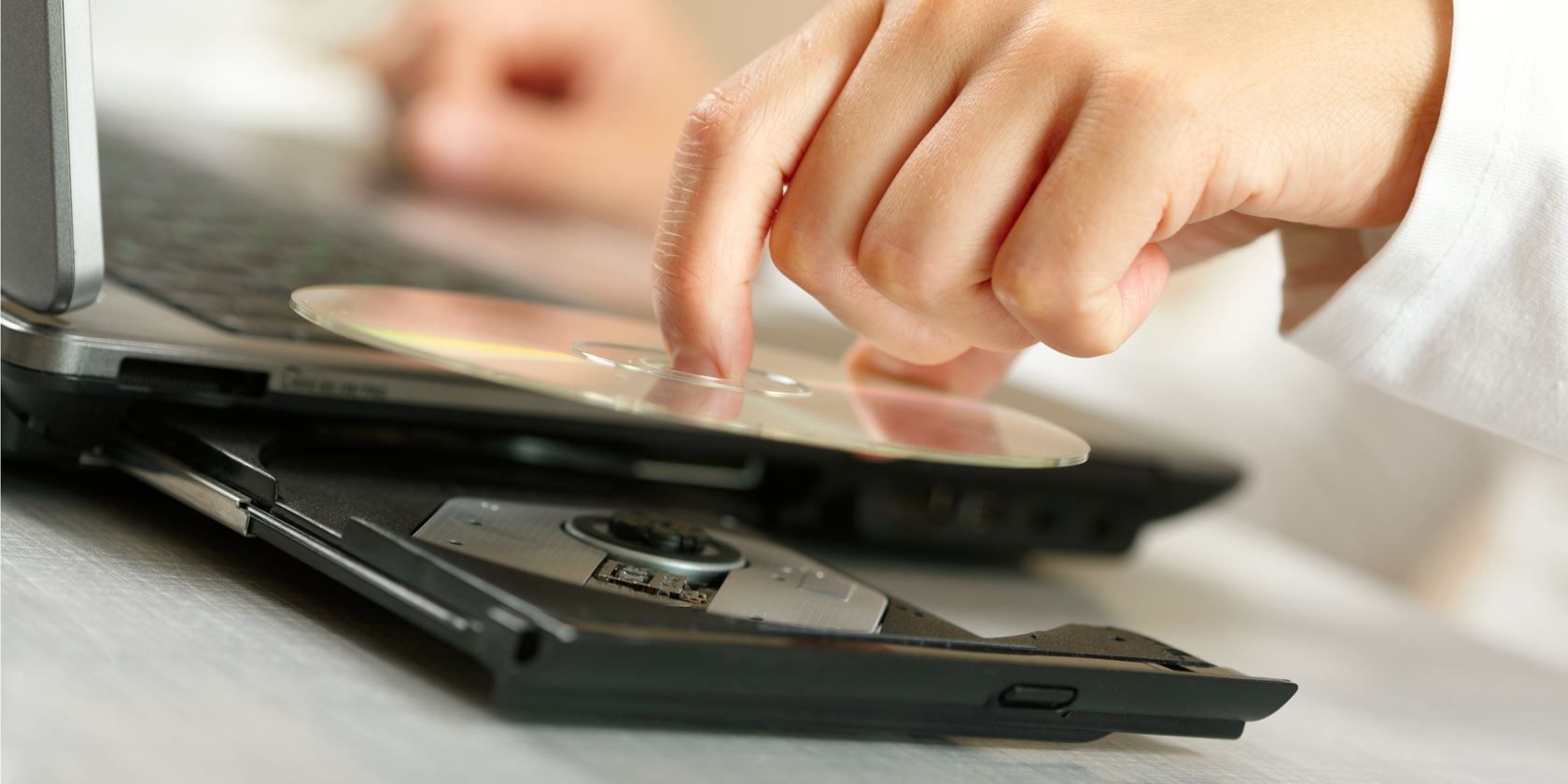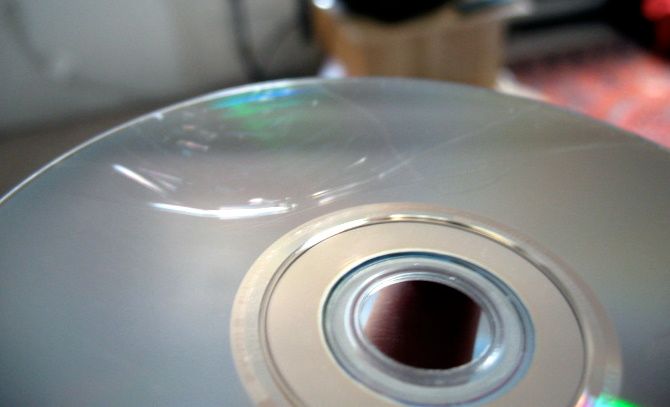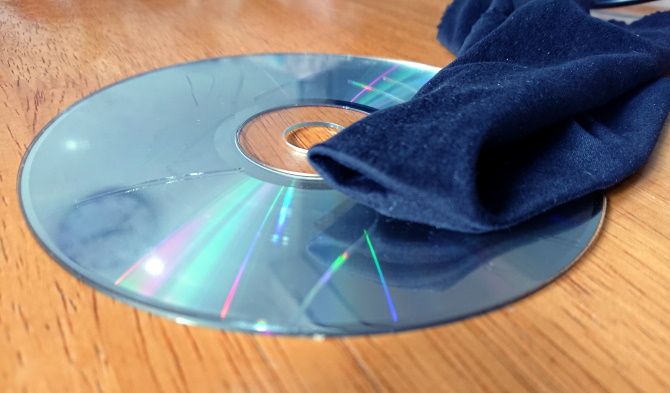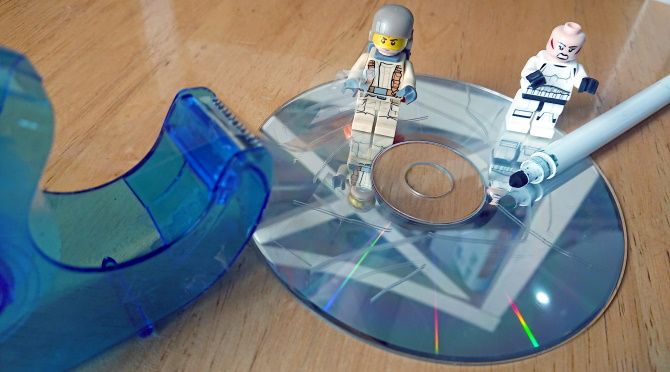
Your compact disc (CD) is scratched and won’t play. Perhaps it is an album of music, maybe you have photos on the disc. Or perhaps it’s a DVD that is scratched, with your favorite movie on it, or even a game disc.
Want to get that scratched disc working again? Amazingly, you can! Here’s how to fix a scratched CD or DVD, make it playable on any device, and what to do next.
Want Data Off That CD? You’ll Need to Fix It First

If your CD or DVD is scratched and won’t play, it must be repaired before it will work again. Repairing any type of optical disc isn’t as difficult as it might sound.
In most cases, a scratch in the disc is only at the surface level. The actual data on the disc is stored on a material sandwiched between two layers of polycarbonate. That’s the transparent plastic of the disc, the surface prone to scratching.
Taking care of your discs is clearly a good idea, so you should always put them back in the case when done. Also take the time to ensure the inside of the case is clean, too. Bits of grit can scratch the disc when it is apparently safely put away. Also, you should take care removing a disc that gets stuck in the DVD drive. This is another occasion when optical discs can be scratched or otherwise damaged.
However, if blemishes playback, there’s a good chance you can fix the scratched DVD or CD and make it playable again.
Several methods have been found to work. None of them require any special materials or skills, and all can be done with household items.
5 Ways to Repair a CD or DVD
If the disc has scratches preventing successful reading, you can try to repair them to make the disc playable again.
Here are five ways you might (temporarily) repair a CD, DVD, or even Blu-ray disc.
1. Fix Your Optical Disc by Cleaning It

Much of the time, discs we think are scratched—and therefore unreadable—aren’t all that bad.
Often, the scratches are merely surface scuffs. Rather than deep gashes that divert the laser in the disc reader away from the encoded data on the metal layer, some scratches might simply be dirt.
The check this, clean the surface of the disc with a soft lint-free cloth. You can use a gentle detergent (or rubbing alcohol) if there are grease spots. Make sure there are no fingerprints or dust particles. Don’t scrub too hard as you may do more harm than good this way.
Where children, pets, and/or fast food is regularly found, look out also for food and liquid debris.
With any luck, your disc will work once cleaned.
2. Repair Scratches on Damaged CDs with Toothpaste
Incredibly, this is possible using a whitening toothpaste or some polish (especially those used by opticians) although Brasso also works.
But how does toothpaste fix scratches on your CDs? The principle here is simple: the toothpaste fills the gap caused by the scratch. The laser is then correctly focused to accurately read the data on the disc. Follow these steps:
- Clean the disc as described above.
- Deposit a small amount of toothpaste (or your chosen filler) onto a plate. With a wooden toothpick, apply a little filler along the scratch.
- Rub gently with a suitable cloth, from the center of the scratch outwards.
After a few moments you will see the scratch diminishing. It might even disappear.
While the cosmetic results might be satisfactory, the practical impact can be hit and miss.
3. Can a Light Bulb Fix a Scratched DVD?
Another DIY scratch fixing technique is to employ a lamp with an incandescent 60W light bulb.
With the optical disc threaded onto your index finger, shiny side up, hold the disc around 10cm from the lamp. Rotate the disc for a maximum of 20 seconds, then remove. Note that too much exposure to the heat can damage the disc.
Play the disc while it is still warm, immediately copying the data to your computer.
If you’re not getting any joy so far, this might be worth a go.
4. Fix a Scratched Disc With Wax
Incredibly, scratches in the surface of a CD or DVD can be fixed with softened wax!
As with the toothpaste fix, you can use shoe polish, lip balm, furniture wax, or even petroleum jelly. Again, rub it into the surface of the disc to fill the scratch. With a lint-free cloth, wipe of the excess wax, with a radial action.
Once you’re done, try and play the disc. If it works, copy the data to your PC.
5. Fix Holes in the Disc With Scotch Tape

Not all disc issues are limited to the plastic layer. In some cases, holes can appear in the aluminum layer. As this is where the data is stored, it can prove devastating.
If a hole is found by the laser, it will simply stop reading.
The answer is to cover the holes, thereby prompting the laser to keep reading. Hold the disc shiny side up and find the holes. Then flip it over and mark the gaps with a permanent marker. Finish by placing two small strips of tape over each whole you find.
With this done, the disc will play, allowing you to recover most of the data. Of course, any data stored where the holes appeared will be lost.
What to Do Next With Your Scratched CD
So, what have we learned? Well, you don’t need to bin those scratched CDs and DVDs right away. Instead of using them as coasters or windchimes, use one of these methods to overcome the scratches and retrieve data.
To recap, you can fix a scratched CD using the following techniques:
- Clean the disc with a soft cloth, warm water, and soap
- Use toothpaste to fill the scratches
- Soften the polycarbonate later with a hot lamp
- Fill the scratches with wax
- Find and cover any holes in the data layer with a Sharpie and tape
With the disc spinning and the player reading it, you can be reasonably happy. The disc is repaired, albeit temporarily. It’s time to take the time to get the data off it.
Whether you’re trying to rescue audio, data, or video discs, don’t rest on your laurels. Instead, copy the data to another disc, your hard disk drive, or whatever your preferred storage solution is.
Not sure how to do this? Find out how to recover data from a scratched CD or DVD.
Read the full article: Can You Fix a Scratched CD With Toothpaste? Here’s How!
Read Full Article
No comments:
Post a Comment